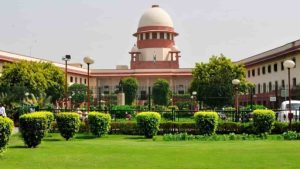
The Supreme Court on Monday listed for hearing on April 14, a fresh petition filed by the Gyanvapi Mosque Management Committee, seeking permission to allow Wuzu (ablution) inside the premises of Gyanvapi mosque during the holy month of Ramadan.
Terming it as a ‘procedural matter,’ the Bench led by Chief Justice of India D.Y. Chandrachud agreed to take it up for hearing on April 14.
Representing the GMMC, Senior Advocate Huzefa Ahmadi requested the Apex Court to hear the case today itself, stating that the number of worshippers at the Mosque had increased.
The Senior Advocate said they were insisting because of Ramzan. They should have come earlier. He said they only sought arrangements for Wuzu, adding that water for Wuzu was being used from a drum, which was not sufficient.
The CJI noted that Justice Surya Kant was part of the Bench hearing the case. Therefore, the matter would be heard on April 14.
Earlier on April 6, the Muslim parties in Gyanvapi-Kashi Vishwanath dispute had approached the Supreme Court for permission to allow ablution near the spot where a purported Shivling was reportedly found in the Mosque complex.
The Gyanvapi dispute began soon after the Hindu devotees approached a civil court claiming the right to worship inside the Mosque premises, on the grounds that it was a Hindu temple and still housed Hindu deities.
A survey of the mosque was ordered by the civil court under an advocate commissioner. The advocate commissioner then conducted the videographed survey and submitted a report to the civil court.
The Hindu parties on the basis of the survey claimed that one of the objects discovered at the site was a Shivling, while the Muslim parties disputed the claim and said that it was only a water fountain.
The suit before the civil court then was transferred to the District Judge by the Supreme Court on May 20 in view of the sensitivity of the issue involved.
The District Court held that the suit was not barred under the Places of Worship (Special Provisions) Act, 1991.
A Varanasi court found that the suit filed by Hindu parties seeking possessory rights over Gyanvapi Mosque was maintainable.
This decision was challenged before the High Court by the Management Commeittee of the Anjuman Intezamia Masjid, which reserved its verdict in December.
The High Court had lately asked the Director General of ASI to submit his opinion on whether carbon dating, Ground Penetrating Radar (GPR), excavation and other methods to determine the age of the disputed object at Gyanvapi mosque, would damage the object.
The post Supreme Court to hear plea seeking permission for Wuzu in Gyanvapi Mosque on April 14 appeared first on India Legal.

Please don't enter any spam link in comment box ConversionConversion EmoticonEmoticon